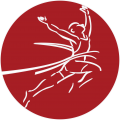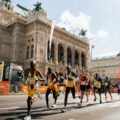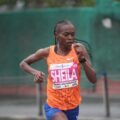Another Olympic Agenda 2020 recommendation was implemented this week when the International Forum for Sports Integrity (IFSI) met for the first time in Lausanne on Monday 13 April at the initiative of the International Olympic Committee (IOC).
Coinciding with Monday’s forum, the IOC launched its new Integrity and Compliance Hotline, a new reporting mechanism for potential cases of competition manipulation as well as other violations of the integrity of sport.
The web-based hotline is open to athletes, coaches, referees and the public, and guarantees 100 per cent anonymity.
Anyone can report suspicious approaches or activities related to competition manipulation and/or infringements of the IOC Code of Ethics or other matters – including financial misconduct or other legal, regulatory and ethical breaches – over which the IOC has jurisdiction.
First IFSI adopts roadmap for future action to protect clean athletes
The IFSI, a successor to the Founding Working Group on the Fight Against Irregular and Illegal Betting in Sport, reviewed what has been delivered and prepared a roadmap for future action aimed at strengthening and coordinating all activities to protect clean athletes from match-fixing, manipulation of competitions and related corruption.
The Forum called on European and non-European governments to sign the Council of Europe Convention on the Manipulation of Sports Competitions, which particularly ensures that domestic laws enable criminal investigations and sanctioning of the manipulation of sports competitions when it involves either coercive, corrupt or fraudulent practices.
The meeting was chaired by IOC President Thomas Bach and included representatives from world governments, the Council of Europe, the European Union, INTERPOL, Europol, United Nations agencies, sports betting operators, Olympic Movement stakeholders and others.
The Forum is fully supported by the Association of National Olympic Committees (ANOC), Association of Summer Olympic International Federations (ASOIF) and Association of International Olympic Winter Sports Federations (AIOWF).
The measures adopted by the IFSI today are centred on three main themes:
- Education and Information;
- Intelligence and Investigations; and
- Legislation and Regulation.
As emphasised in Olympic Agenda 2020, the IOC’s strategic roadmap for the future of the Olympic Movement, the protection of clean athletes requires robust educational programmes.
The IFSI called for the proactive and preventive educational measures being taken at the international and national levels to be reproduced at the local level. Using elite athletes to act as role models in their communities was recommended as one way to do this.
The role of governments in raising awareness and coordinating an integrated approach among police, public prosecutors and ministries of justice was also stressed.
The protection of clean athletes also requires strong channels for the exchange of information and intelligence.
These channels have been strengthened by the Council of Europe Convention on the Manipulation of Sports Competitions and the IOC’s Integrity Betting Intelligence System (IBIS), the centralised system for exchange between the Olympic Movement, sports betting operators and regulators.
The IFSI called for the creation of “national platforms” in line with those outlined in the Council of Europe Convention that would facilitate cooperation between all stakeholders. Additionally, the IOC’s IBIS has to be integrated within this network of “national platforms”.
It was agreed that the role of “sports integrity officers” should be defined and strengthened within sports organisations at all levels, including National Olympic Committees, International Federations and National Federations.
A robust regulatory framework is also needed for the successful protection of clean athletes.
To that end, the IFSI called on the Olympic Movement to develop global sports minimum standards (possibly in the form of a Code for the Olympic Movement) regarding the manipulation of competitions and related corruption.
Olympic Agenda 2020
“In Olympic Agenda 2020 we stressed the need to protect clean athletes from match-fixing, manipulation of competitions and related corruption,” said the IOC President.
“Today’s forum has brought all key players around the table to address this need and coordinate our action. We are pleased with the support we have received so far in this regard, in particular from the Council of Europe.
“We are intensifying our efforts to protect the integrity of sport and we ask that European and non-European governments sign the Council of Europe’s Convention on the Manipulation of Sports Competitions and continue to work hand-in-hand with us.”
The IFSI forms part of Recommendation 16 of Olympic Agenda 2020, the IOC’s strategic roadmap for the future of the Olympic Movement.
It is just one of the many measures, regarding the special fund of USD 20 million the IOC set up to protect clean athletes, which have already been implemented.
A prevention programme for the fight against match-fixing and related corruption is under way in cooperation with INTERPOL and financed by the IOC.
In addition, the IOC is in the process of implementing mandatory Integrity E-Learning for all athletes, officials and IOC/NOC staff prior to or during the Olympic Games.








